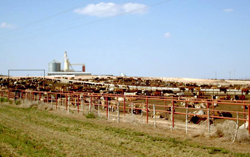 |
| Courtesy of H20, Creative Commons BY-SA 3.0 |
In December, the FDA asked animal health companies to voluntarily stop using antibiotics to promote growth of meatier cows, pigs, and other livestock. Now, the agency says 25 companies have signed on to its new guidelines, including Eli Lilly's ($LLY) Elanco, Novartis' ($NVS) animal health unit, and Zoetis ($ZTS).
In a nutshell, the FDA asked animal health companies to revise the labels on key antibiotics so they no longer refer to food-production uses and only reflect medicinal uses. With those changes, livestock producers that use antibiotics to fatten up their animals would be breaking the law. The companies have three years to revise the product labels.
The guidelines are meant to thwart the growing problem of antibiotic resistance, which some scientists blame on antibiotics in the food supply. Drug-resistant bacteria strike 2 million Americans a year and cause 23,000 deaths, according to the CDC. The FDA has long been under fire for failing to keep a lid on antibiotic use in farm animals. In January, the Natural Resources Defense Council (NRDC) released a report containing evidence that the FDA's scientists were aware of 18 farm antibiotics that posed a high risk of spawning antibiotic-resistant bacteria.
As part of their pact with the FDA, the animal health companies will no longer market agricultural antibiotics over the counter, the FDA says. The products will be available only by prescription from a veterinarian. The 25 participating companies are responsible for more than 99% of antibiotics affected by the guidelines, the FDA said in a statement.
Still, some critics worry that because the guidelines are voluntary, the FDA will have no mechanism by which to enforce them--and that may not do much to keep antibiotics out of the food supply. "This plan is likely to lead to label changes, not a reduction in use," Avinash Kar, a health attorney with the Natural Resources Defense Council, told Reuters.
- here's the Reuters story
- here's the FDA's statement